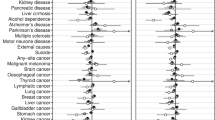Abstract
Data from the Framingham Heart Study, collected in Framingham, MA (United States) during 1948–86, were used to evaluate the relation of parental age at birth to the risk of breast cancer among daughters. After 38 years of follow-up, 149 breast cancer cases occurred among 2,662 women. All but two cases were confirmed by histologic report. The rate of breast cancer increased among daughters with increasing maternal age at birth up to the mid-30s, where the rate levelled off. A similar pattern was observed with paternal age. After adjustment for other confouding factors and paternal age, the rate ratios for breast cancer in daughters whose mothers were aged 26 to 31 years and 32 or more years at their birth, relative to women whose mothers were aged 25 years or younger, were 1.5 (95 percent confidence interval [CI]=1.0–2.4) and 1.3 (CI=0.8–2.2), respectively. However, there was no longer an association between paternal age at birth and risk of breast cancer after controlling for maternal age and other risk factors.
Similar content being viewed by others
References
Standfast SJ. Birth characteristics of women dying from breast cancer. JNCI 1967; 39: 33–42.
Henderson BE, Powell D, Rosario I, et al. An epidemiologic study of breast cancer. JNCI 1974; 53: 609–14.
Rothman KJ, MacMahon B, Lin TM, et al. Maternal age and birth rank of women with breast cancer. JNCI 1980; 65: 719–22.
Le Marchand L, Kolonel LN, Myers BC, et al. Birth characteristics of premenopausal women with breast cancer. Br J Cancer 1988; 57: 437–9.
Janerich DT, Hayden CL, Thompson WD, et al.. Epidemiologic evidence of perinatal influence in the etiology of adult cancer. J Clin Epidemiol 1989; 42: 151–7.
Thompson WD, Janerich DT. Maternal age at birth and risk of breast cancer in daughters. Epidemiol 1990; 1: 101–6.
Henderson BE, Bogdanoff E, Gerkins VR, et al. Evaluation of cancer risk factors in a retirement community. Cancer Res 1974; 34: 1045–8.
Baron JA, Vessey M, McPherson K, Yeates D. Maternal age and breast cancer risk. JNCI 1984; 72: 1307–9.
van Leeuwen FE, Rookus MA. It maternal age at birth a risk factor for breast cancer (Abstract). Am J Epidemiol 1992; 136: 1024.
Colditz GA, Willett WC, Stampfer MJ, et al. Parental age at birth and risk of breast cancer in daughters: a prospective study among US women. Cancer Causes Control 1990; 2: 31–6.
Trichopolous D. Hypothesis: does breast cancer originate in utero Lancet 1990; 335: 393–40.
Kreger BE, Splansky GL, Schatzkin AS. The cancer experience in the Framingham Heart Study cohort. Cancer 1991; 67: 1–6.
World Health Organization. International Classification of Diseases, Eigbtb Revision, Geneva, Switzerland: WHO, 1967.
Wileox AJ, Sandler DP, Everson RB. Using father's age to explore the role of germ cell mutation as a cause of human cancer. Int J Epidemiol 1988: 17: 469–71.
Panagiotopoulou K, Katsouyanni K, Petridou E, et al. Maternal age, parity, and pregnancy estrogens. Cancer Causes Control 1990; 1: 119–24.
Trapp M, Kato K, Rohnet HG, et al. Human placental lactogen and unconjugated estriol concentrations in twin pregnancy: monitoring of fetal development in intrauterine growth retardation and single intrauterine fetal death. Am J Obstet Gynecol 1986; 155: 1027–31.
Doherty J. Does breast cancer originate in utero? (Letter). Lancet 1990; 335: 1604.
Hsich Cc, Lan SJ, Ekbom A, et al. Twin membership and breast cancer. Am J Epidemiol 1992; 136: 1321–6.
Additional information
Drs Zhang, Cupples, and Coulton are with the Department of Epidemiology and Biostatistics, School of Public Health, Boston University, Boston, MA, USA, Dr Rosenberg is with the Slone Epidemiology Unit, Boston University School of Medicine, Brookline, MA. Dr Kreger is with the Section of Preventive Medicine and Epidemiology, The Evans Memorial Department of Clinical Research, Boston University Medical Center, Boston, MA. Address correspondence to Dr Zhang, Department of Epidemiology and Biostatistics, School of Public Health, Boston University, 80 East Concord Street, Boston, MA, 02118-2394, USA.
Rights and permissions
About this article
Cite this article
Zhang, Y., Cupples, L.A., Rosenberg, L. et al. Parental ages at birth in relation to a daughter's risk of breast cancer among female participants in the Framingham study (United States). Cancer Causes Control 6, 23–29 (1995). https://doi.org/10.1007/BF00051677
Received:
Accepted:
Issue Date:
DOI: https://doi.org/10.1007/BF00051677




